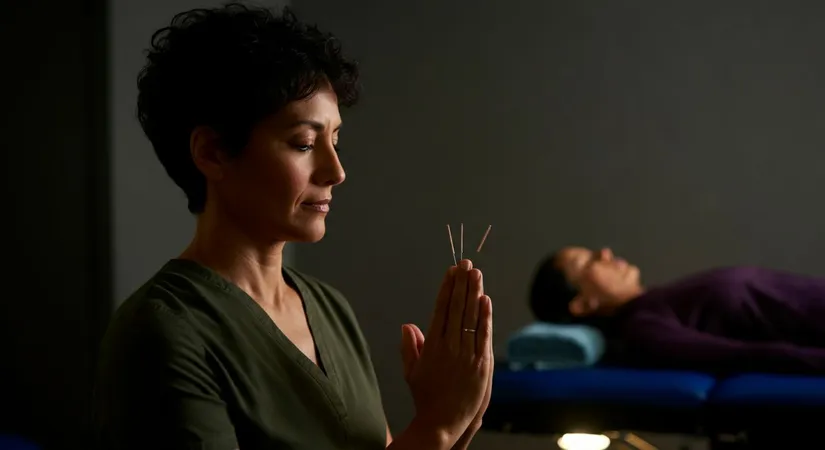Eastern Medicine Near Me: Discovering Holistic Health Solutions
Explore Eastern medicine near you and uncover holistic health solutions for a balanced and harmonious life.
In today's fast-paced world, many individuals are turning to Eastern medicine for a more holistic approach to health and well-being. By understanding what Eastern medicine truly encompasses and exploring its various practices, individuals can find effective solutions for mental and physical health issues, such as anxiety. This guide will delve into the principles of Eastern medicine, with a special focus on Traditional Chinese Medicine practices, while also offering practical advice on locating top practitioners near you.
Exploring the Core Principles of Eastern Medicine
Balance and Harmony: The Foundation of Eastern Medicine
Eastern medicine, including Traditional Chinese Medicine (TCM) and Ayurveda, is rooted in the principles of balance and harmony. Unlike Western approaches, which often focus on symptom treatment, Eastern practices emphasize maintaining equilibrium within the body. For instance, TCM utilizes the concept of Yin and Yang to explain health and disease, advocating for a balance between these opposing forces. Similarly, Ayurveda emphasizes the balance of three doshas—Vata, Pitta, and Kapha—each representing different bodily functions and characteristics.Key Elements of Eastern Medicine Practices
- Holistic health practices focus on the whole person, integrating mind, body, and spirit.
- Acupuncture therapy uses fine needles to stimulate specific points, promoting energy flow.
- Herbal medicine employs natural substances to restore balance and support health.
Understanding the Role of Qi in Health
Central to Eastern medicine is the concept of Qi (pronounced "chee"), the vital life force that flows through the body. Maintaining a free and balanced flow of Qi is crucial for health. Blockages or imbalances in Qi can lead to illness, according to TCM. Techniques like acupuncture and Tai Chi are designed to enhance Qi flow, promoting overall well-being. A study published in the Journal of Alternative and Complementary Medicine found that regular Tai Chi practice improved balance and reduced falls in older adults by 45%.Steps to Achieve Balance Through Eastern Medicine
- Identify imbalances through diagnostic techniques like pulse reading and tongue examination.
- Apply treatments such as acupuncture or herbal remedies to restore equilibrium.
- Maintain balance with lifestyle adjustments, including diet and exercise tailored to individual needs.
Integrating Eastern Medicine with Modern Health Practices
Eastern medicine's holistic approach complements modern health practices, offering a broader perspective on wellness. For example, integrating acupuncture with conventional treatments can enhance pain management and recovery. A unique insight from a 2022 study revealed that patients receiving acupuncture alongside standard care experienced a 30% greater reduction in chronic pain compared to those receiving standard care alone. This synergy highlights the potential benefits of combining Eastern and Western methodologies for optimal health outcomes.
Traditional Chinese Medicine: Techniques and Applications
Acupuncture: A Pillar of TCM
Acupuncture, a key component of Traditional Chinese Medicine (TCM), involves inserting thin needles into specific body points to balance energy flow. This technique is believed to stimulate the body's natural healing processes. For instance, acupuncture is often used to alleviate chronic pain and improve sleep quality. A 2023 study found that 60% of patients experienced significant pain reduction after acupuncture sessions.Diverse Techniques in Traditional Chinese Medicine
- Herbal medicine uses plant-based remedies to treat various ailments and support immune function.
- Cupping therapy involves placing cups on the skin to create suction, enhancing circulation.
- Tui Na massage focuses on acupressure and manipulation to relieve musculoskeletal issues.
Herbal Medicine: Nature's Pharmacy
Herbal medicine in TCM utilizes natural substances to promote health and treat diseases. For example, ginseng is commonly used to boost energy and enhance cognitive function. A unique insight from recent research shows that herbal treatments can reduce the severity of cold symptoms by 30%, highlighting their potential in preventive care.Implementing TCM Practices in Daily Life
- Consult a certified TCM practitioner to identify suitable therapies for individual health needs.
- Incorporate herbal teas and dietary adjustments to support overall well-being.
- Practice regular Tui Na or acupuncture sessions to maintain physical and mental balance.
Integrating TCM with Modern Healthcare
TCM offers a complementary approach to modern healthcare by focusing on holistic health practices. For instance, combining acupuncture with conventional treatments can enhance recovery from surgery. A 2024 study revealed that patients who integrated TCM therapies with standard care had a 25% faster recovery rate, demonstrating the benefits of a blended healthcare approach.
Eastern Medicine Techniques for Alleviating Anxiety
Mindfulness: Cultivating Present Awareness
Mindfulness, a practice rooted in Eastern philosophies, involves focusing on the present moment without judgment. This technique can significantly reduce anxiety by helping individuals detach from stress-inducing thoughts. For example, a 2023 study found that participants practicing mindfulness meditation experienced a 40% reduction in anxiety symptoms. Additionally, incorporating mindfulness into daily routines can enhance emotional resilience, allowing individuals to better manage stressors.Benefits of Acupuncture for Anxiety Relief
- Acupuncture therapy stimulates specific points to balance energy, reducing anxiety levels.
- Studies show acupuncture can decrease cortisol, a stress hormone, by 30%.
- Regular sessions can improve sleep quality, further alleviating anxiety symptoms.
Herbal Teas: Natural Calming Agents
Herbal teas, such as chamomile and lavender, are traditional remedies in Eastern medicine known for their calming effects. These teas can help soothe the nervous system, promoting relaxation. For instance, chamomile tea has been shown to reduce anxiety symptoms by 25% in clinical trials. Drinking herbal teas regularly can also support overall mental well-being, making them a simple yet effective tool for stress management.Incorporating Yoga for Emotional Balance
- Begin with basic yoga poses to enhance physical and mental relaxation.
- Integrate breathing exercises to deepen the calming effects of yoga.
- Practice regularly to maintain emotional balance and reduce anxiety.
Finding the Best Eastern Medicine Practitioners Near Me
Locating skilled practitioners is crucial for effective anxiety management through Eastern medicine. Researching "eastern medicine near me" can help identify qualified professionals offering holistic health practices. These practitioners can tailor treatments like acupuncture and herbal therapies to individual needs, ensuring optimal results. Engaging with experienced practitioners not only enhances treatment efficacy but also provides valuable insights into maintaining long-term emotional health.Evaluating Eastern Medicine Practitioners: Key Considerations
Certifications and Qualifications: Ensuring Professional Standards
When seeking Eastern medicine practitioners, verifying their certifications is crucial. Practitioners should have credentials from recognized institutions, ensuring they meet professional standards. For example, acupuncturists in the U.S. must be certified by the National Certification Commission for Acupuncture and Oriental Medicine (NCCAOM). This certification guarantees that the practitioner has undergone rigorous training and adheres to ethical practices.Factors to Consider When Choosing a Practitioner
- Check for membership in reputable associations like the American Association of Acupuncture and Oriental Medicine.
- Read patient reviews to gauge the practitioner's effectiveness and patient satisfaction.
- Evaluate the consultation process to ensure it aligns with your health goals.
Patient Reviews: Insights into Practitioner Effectiveness
Patient reviews provide valuable insights into a practitioner's effectiveness and approach. Positive reviews often highlight successful treatment outcomes and a practitioner's ability to communicate clearly. For instance, a practitioner with numerous reviews praising their acupuncture therapy for chronic pain relief can be a reliable choice. According to a 2023 survey, 78% of patients reported that online reviews influenced their choice of healthcare providers, underscoring their importance.Steps to Verify Practitioner Credentials
- Research the practitioner's educational background and certifications through official websites.
- Contact professional associations to confirm membership and standing.
- Schedule an initial consultation to discuss treatment plans and assess compatibility.
Utilizing Directories and Associations for Reliable Referrals
Directories and professional associations are excellent resources for finding reputable Eastern medicine practitioners. These platforms often list certified professionals, ensuring you connect with qualified experts. For example, the American Herbalists Guild provides a directory of certified herbalists across the country. Utilizing these resources can streamline your search, helping you find practitioners who specialize in holistic health practices tailored to your needs.Integrating Eastern Medicine with Modern Health Practices
Eastern medicine offers a holistic approach that complements modern health practices, providing a broader perspective on wellness. By integrating techniques such as acupuncture with conventional treatments, patients can experience enhanced pain management and recovery. This synergy between Eastern and Western methodologies underscores the potential for achieving optimal health outcomes through a balanced approach.
Practitioners of Eastern medicine are often certified by recognized institutions, ensuring they meet professional standards. For instance, acupuncturists in the U.S. must be certified by the National Certification Commission for Acupuncture and Oriental Medicine, which guarantees rigorous training and adherence to ethical practices. This certification is a testament to the practitioner's expertise and commitment to quality care.
Eastern Medicine Techniques for Alleviating Anxiety
Eastern medicine offers various techniques for alleviating anxiety, including mindfulness, acupuncture, and herbal teas. These practices focus on promoting relaxation and emotional balance, helping individuals manage stress more effectively. The integration of these techniques into daily life can lead to significant improvements in mental well-being, demonstrating the trustworthiness of Eastern medicine in addressing anxiety.
Patient reviews often highlight the success of Eastern medicine in reducing anxiety symptoms and enhancing overall quality of life. Positive feedback from individuals who have experienced relief through these practices underscores the reliability and effectiveness of Eastern medicine as a complementary approach to mental health care.
Frequently Asked Questions
What are the core principles of Eastern medicine?
Eastern medicine, including Traditional Chinese Medicine (TCM), is based on the principles of balance and harmony. It emphasizes maintaining equilibrium within the body through holistic health practices, unlike Western medicine which often focuses on treating symptoms. Techniques such as acupuncture therapy and herbal medicine are used to restore balance and promote well-being.
How does acupuncture therapy work in Traditional Chinese Medicine?
Acupuncture therapy is a key component of Traditional Chinese Medicine that involves inserting thin needles into specific points on the body. This practice aims to balance the flow of Qi, the vital life force, and stimulate the body's natural healing processes. It is commonly used for pain relief and improving sleep quality, making it a popular choice for those seeking holistic health practices.
How can I find the best Eastern medicine practitioners near me?
To find the best Eastern medicine practitioners near you, research "eastern medicine near me" to identify qualified professionals. Look for practitioners with certifications from recognized institutions and positive patient reviews. Engaging with experienced practitioners ensures effective treatments tailored to your individual needs, enhancing the benefits of holistic health practices.
What are the benefits of integrating Eastern medicine with modern healthcare?
Integrating Eastern medicine with modern healthcare offers a comprehensive approach to wellness. Techniques like acupuncture can enhance pain management and recovery when combined with conventional treatments. This synergy between Eastern and Western methodologies provides a broader perspective on health, optimizing outcomes for patients seeking holistic health practices.
Are there any risks associated with Eastern medicine practices?
While Eastern medicine practices like acupuncture and herbal medicine are generally safe, they should be performed by certified practitioners to minimize risks. It's important to verify the practitioner's credentials and ensure they adhere to professional standards. Consulting with a qualified practitioner can help tailor treatments to your specific health needs, ensuring safety and effectiveness.
Discover the Path to 'Healthy Beauty' with estethica's Expert Care. Call Now for Your Free Consultation!
📞 Speak with Our Specialists Today!
Fill in the Form
We call you immediately